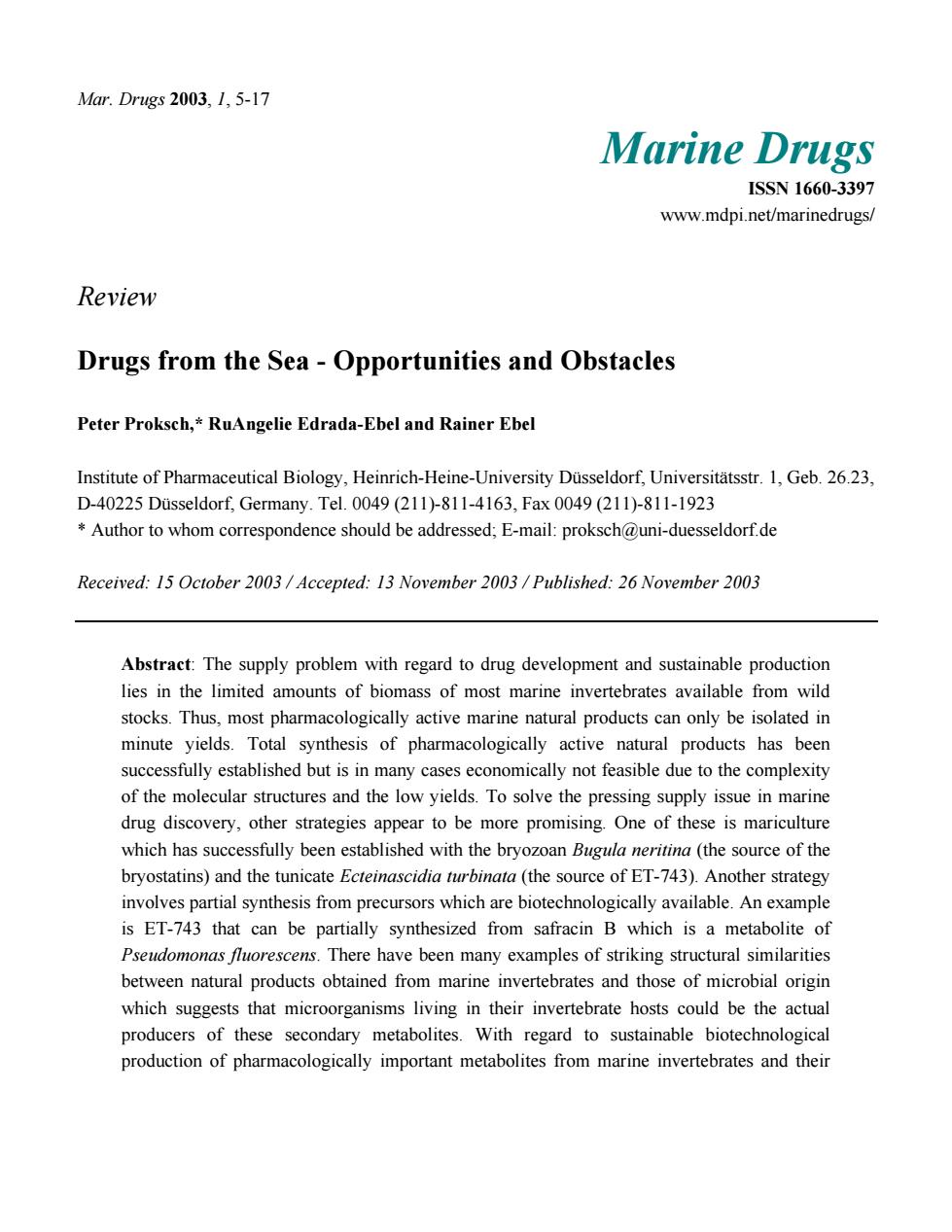正在加载图片...

Mam.Drugs2003,1,5-17 Marine Drugs ISSN1660-3397 www.mdpi.net/marinedrugs/ Review Drugs from the Sea-Opportunities and Obstacles Peter Proksch,*RuAngelie Edrada-Ebel and Rainer Ebel Institute of Pharmaceutical Biology,Heinrich-Heine-University Dusseldorf,Universitatsstr.1,Geb.26.23, D-40225D0 sseldorf,Germany.Tel.0049(211)-811-4163,Fax0049(211)-811-1923 *Author to whom correspondence should be addressed:E-mail:proksch@uni-duesseldorf.de Received:15 October 2003/Accepted:13 November 2003/Published:26 November 2003 Abstract:The supply problem with regard to drug development and sustainable production lies in the limited amounts of biomass of most marine invertebrates available from wild stocks.Thus,most pharmacologically active marine natural products can only be isolated in minute yields.Total synthesis of pharmacologically active natural products has been successfully established but is in many cases economically not feasible due to the complexity of the molecular structures and the low yields.To solve the pressing supply issue in marine drug discovery,other strategies appear to be more promising.One of these is mariculture which has successfully been established with the bryozoan Bugula neritina (the source of the bryostatins)and the tunicate Ecteinascidia turbinata(the source of ET-743).Another strategy involves partial synthesis from precursors which are biotechnologically available.An example is ET-743 that can be partially synthesized from safracin B which is a metabolite of Pseudomonas fluorescens.There have been many examples of striking structural similarities between natural products obtained from marine invertebrates and those of microbial origin which suggests that microorganisms living in their invertebrate hosts could be the actual producers of these secondary metabolites.With regard to sustainable biotechnological production of pharmacologically important metabolites from marine invertebrates and their Mar. Drugs 2003, 1, 5-17 Marine Drugs ISSN 1660-3397 www.mdpi.net/marinedrugs/ Review Drugs from the Sea - Opportunities and Obstacles Peter Proksch,* RuAngelie Edrada-Ebel and Rainer Ebel Institute of Pharmaceutical Biology, Heinrich-Heine-University Düsseldorf, Universitätsstr. 1, Geb. 26.23, D-40225 Düsseldorf, Germany. Tel. 0049 (211)-811-4163, Fax 0049 (211)-811-1923 * Author to whom correspondence should be addressed; E-mail: proksch@uni-duesseldorf.de Received: 15 October 2003 / Accepted: 13 November 2003 / Published: 26 November 2003 Abstract: The supply problem with regard to drug development and sustainable production lies in the limited amounts of biomass of most marine invertebrates available from wild stocks. Thus, most pharmacologically active marine natural products can only be isolated in minute yields. Total synthesis of pharmacologically active natural products has been successfully established but is in many cases economically not feasible due to the complexity of the molecular structures and the low yields. To solve the pressing supply issue in marine drug discovery, other strategies appear to be more promising. One of these is mariculture which has successfully been established with the bryozoan Bugula neritina (the source of the bryostatins) and the tunicate Ecteinascidia turbinata (the source of ET-743). Another strategy involves partial synthesis from precursors which are biotechnologically available. An example is ET-743 that can be partially synthesized from safracin B which is a metabolite of Pseudomonas fluorescens. There have been many examples of striking structural similarities between natural products obtained from marine invertebrates and those of microbial origin which suggests that microorganisms living in their invertebrate hosts could be the actual producers of these secondary metabolites. With regard to sustainable biotechnological production of pharmacologically important metabolites from marine invertebrates and their